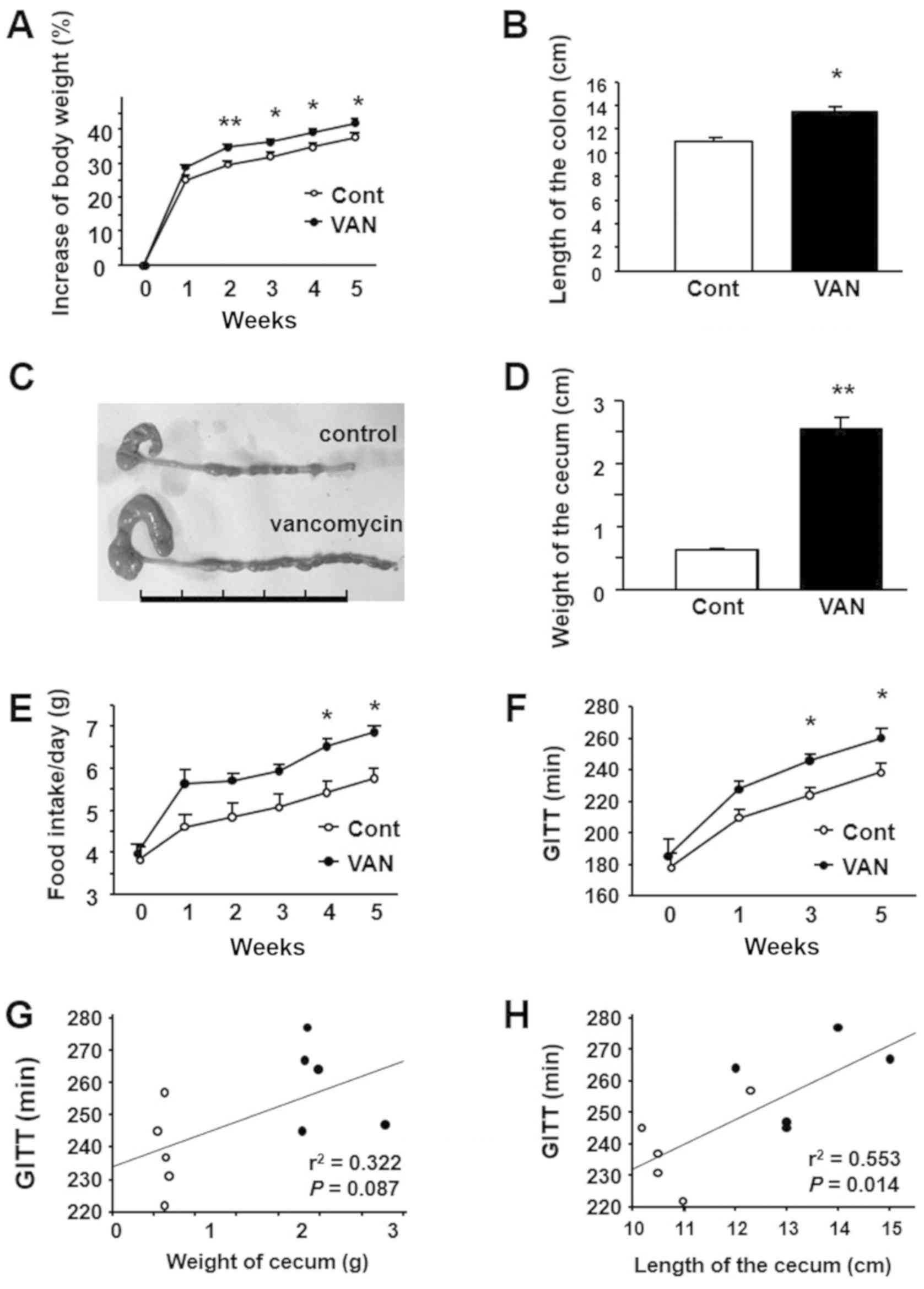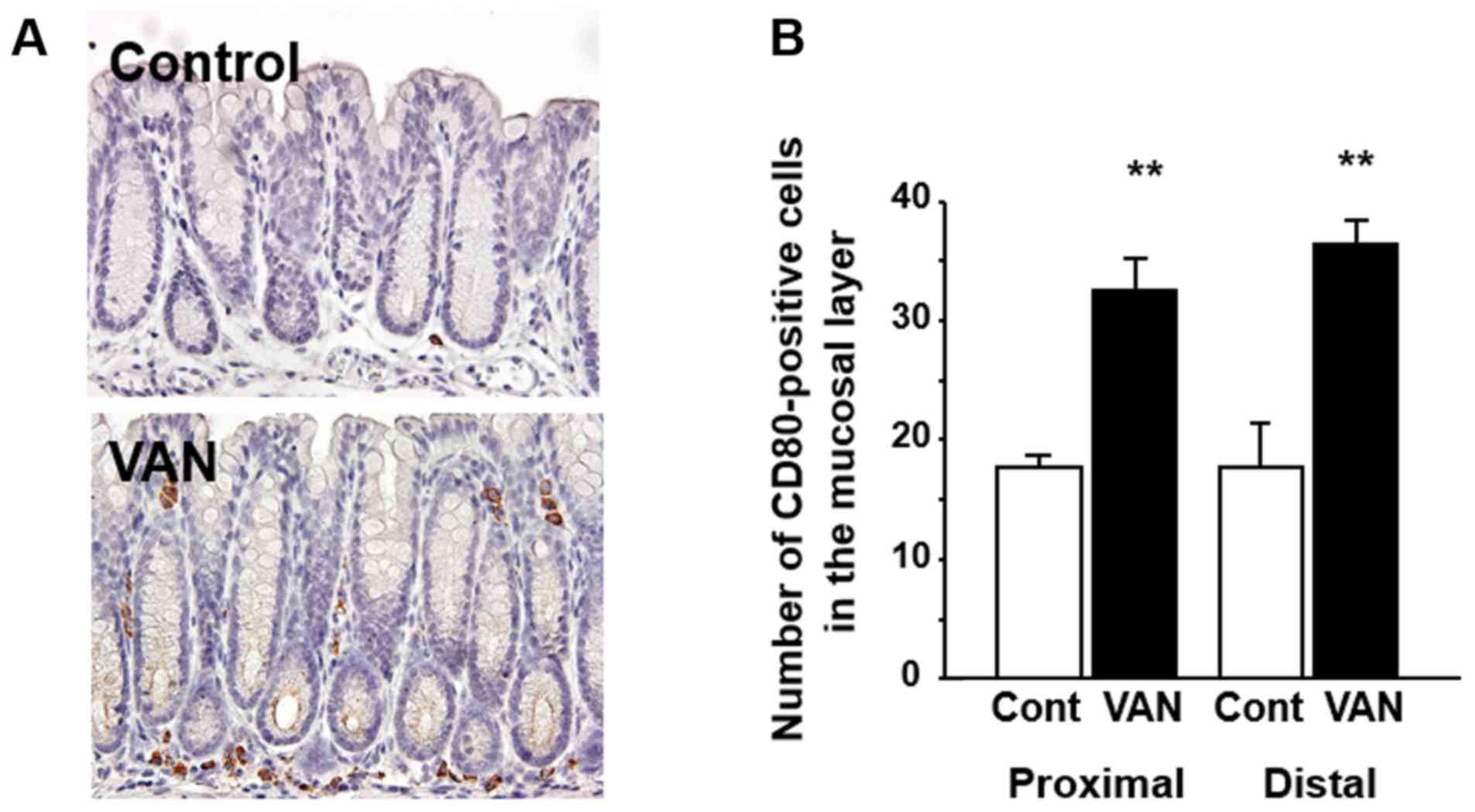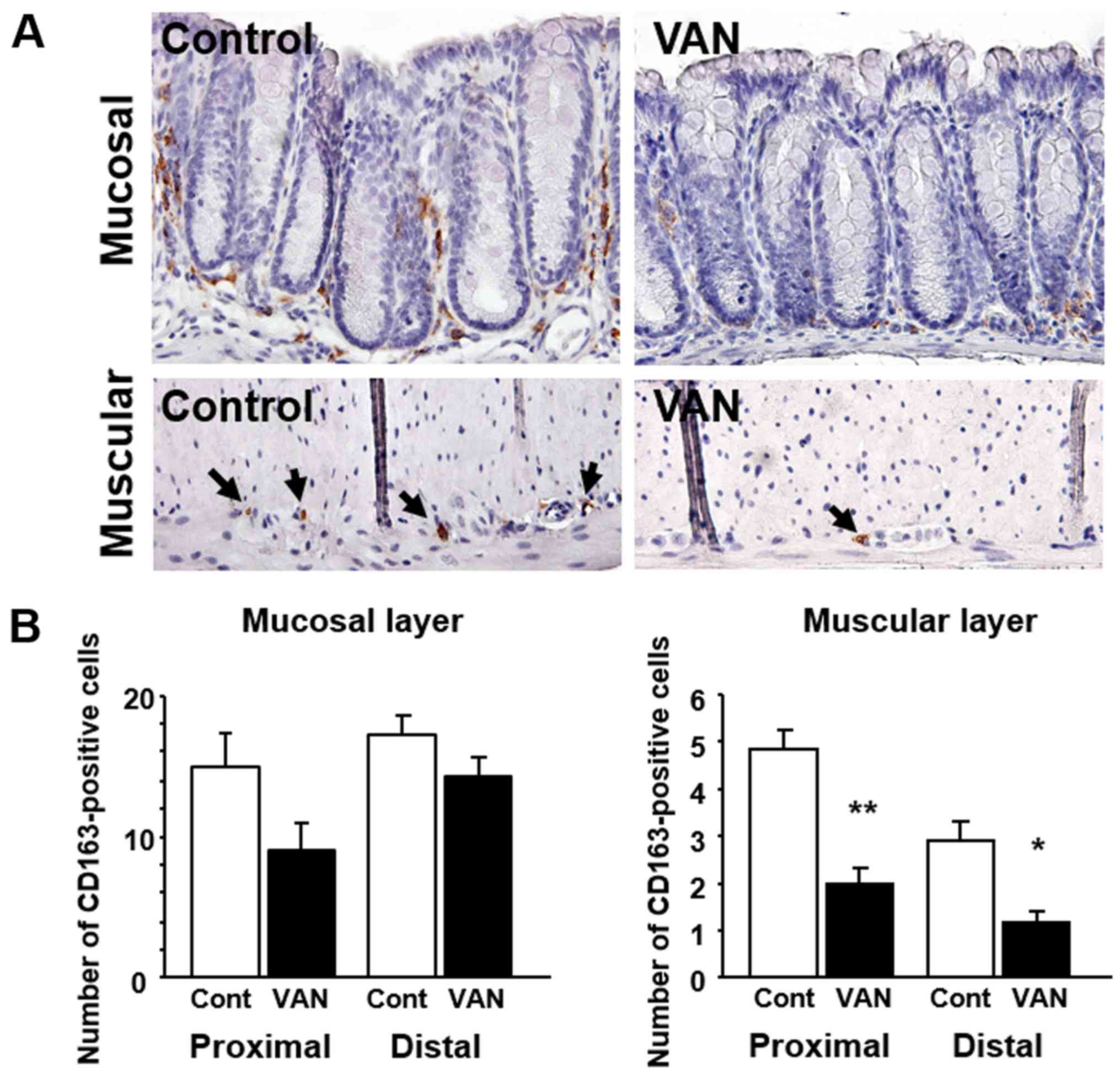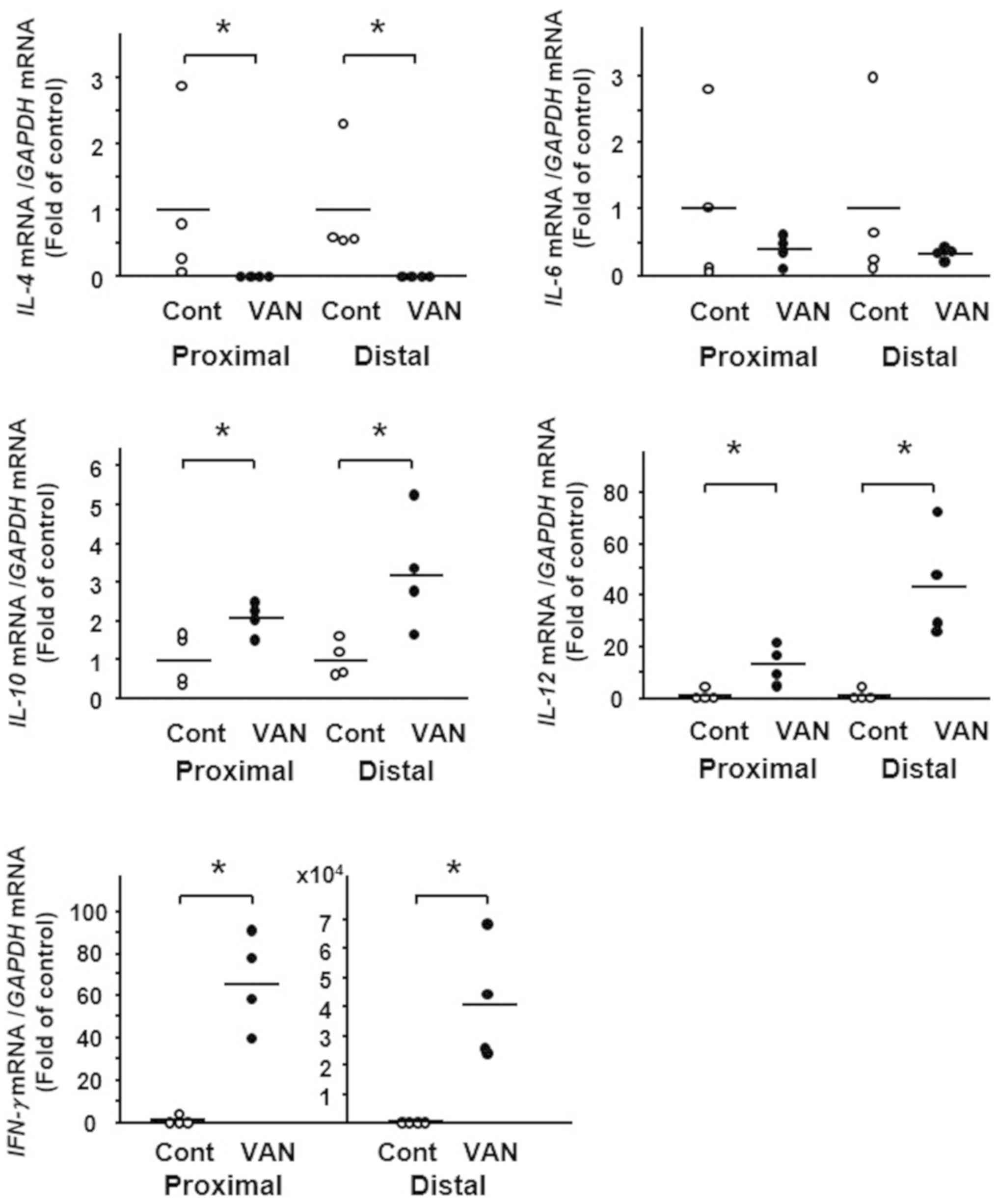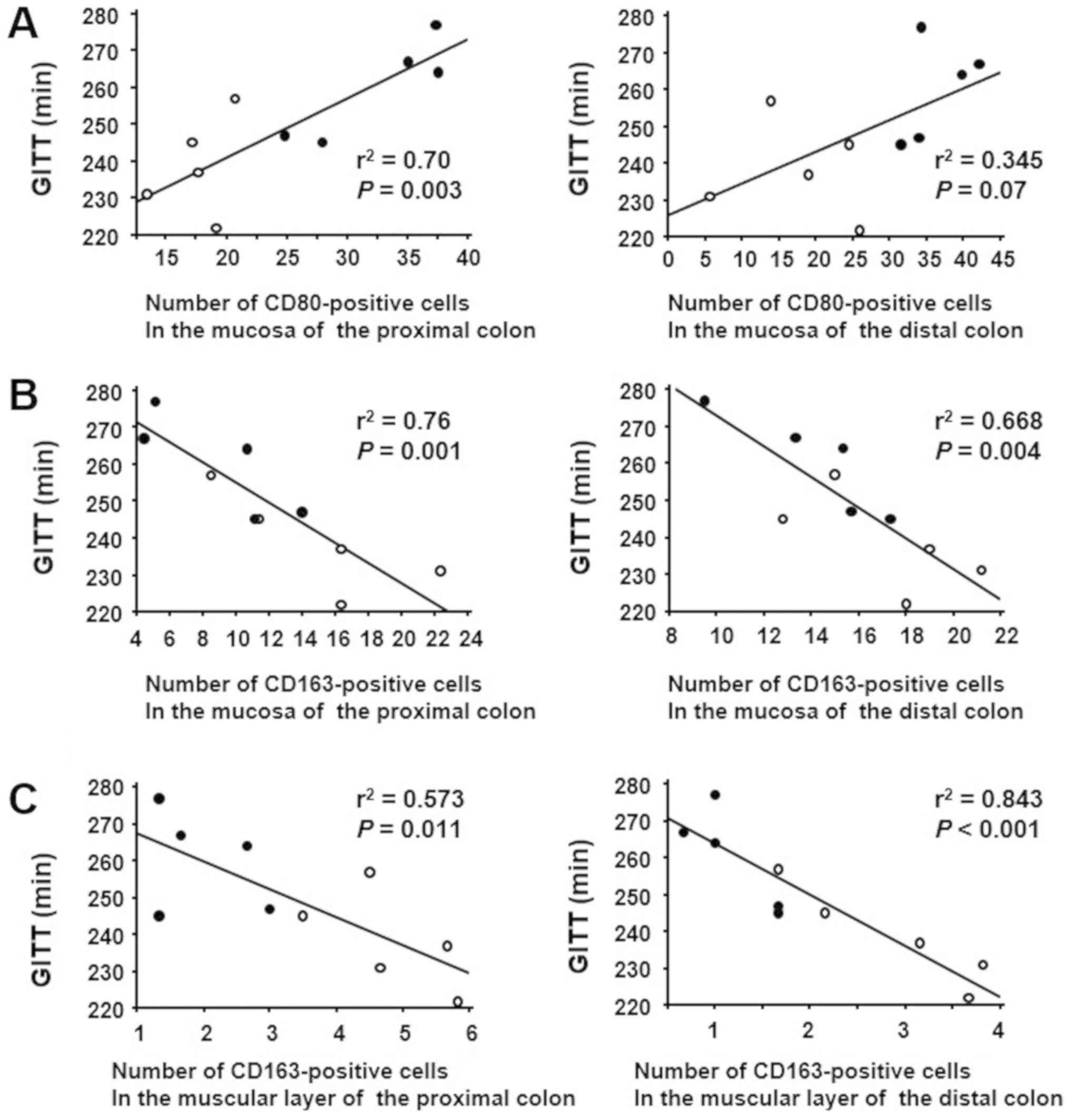|
1
|
Tremaroli V and Bäckhed F: Functional
interactions between the gut microbiota and host metabolism.
Nature. 489:242–249. 2012. View Article : Google Scholar : PubMed/NCBI
|
|
2
|
Canton J, Neculai D and Grinstein S:
Scavenger receptors in homeostasis and immunity. Nat Rev Immunol.
13:621–634. 2013. View
Article : Google Scholar : PubMed/NCBI
|
|
3
|
Jämsen E, Kouri VP, Olkkonen J, Cör A,
Goodman SB, Konttinen YT and Pajarinen J: Characterization of
macrophage polarizing cytokines in the aseptic loosening of total
hip replacements. J Orthop Res. 32:1241–1246. 2014. View Article : Google Scholar : PubMed/NCBI
|
|
4
|
Mosser DM: The many faces of macrophage
activation. J Leukoc Biol. 73:209–212. 2003. View Article : Google Scholar : PubMed/NCBI
|
|
5
|
Stein M, Keshav S, Harris N and Gordon S:
Interleukin 4 potently enhances murine macrophage mannose receptor
activity: A marker of alternative immunologic macrophage
activation. J Exp Med. 176:287–292. 1992. View Article : Google Scholar : PubMed/NCBI
|
|
6
|
Novoselov VV, Sazonova MA, Ivanova EA and
Orekhov AN: Study of the activated macrophage transcriptome. Exp
Mol Pathol. 99:575–580. 2015. View Article : Google Scholar : PubMed/NCBI
|
|
7
|
Muller PA, Koscsó B, Rajani GM, Stevanovic
K, Berres ML, Hashimoto D, Mortha A, Leboeuf M, Li XM, Mucida D, et
al: Crosstalk between muscularis macrophages and enteric neurons
regulates gastrointestinal motility. Cell. 158:300–313. 2014.
View Article : Google Scholar : PubMed/NCBI
|
|
8
|
Theriot CM, Koenigsknecht MJ, Carlson PE
Jr, Hatton GE, Nelson AM, Li B, Huffnagle GB, Z Li J and Young VB:
Antibiotic-induced shifts in the mouse gut microbiome and
metabolome increase susceptibility to Clostridium difficile
infection. Nature Commun. 5:31142014. View Article : Google Scholar
|
|
9
|
Mahana D, Trent CM, Kurtz ZD, Bokulich NA,
Battaglia T, Chung J, Müller CL, Li H, Bonneau RA and Blaser MJ:
Antibiotic perturbation of the murine gut microbiome enhances the
adiposity, insulin resistance, and liver disease associated with
high-fat diet. Genome Med. 8:482016. View Article : Google Scholar : PubMed/NCBI
|
|
10
|
Cho I, Yamanishi S, Cox L, Methé BA,
Zavadil J, Li K, Gao Z, Mahana D, Raju K, Teitler I, et al:
Antibiotics in early life alter the murine colonic microbiome and
adiposity. Nature. 488:621–626. 2012. View Article : Google Scholar : PubMed/NCBI
|
|
11
|
Sekirov I, Tam NM, Jogova M, Robertson ML,
Li Y, Lupp C and Finlay BB: Antibiotic-induced perturbations of the
intestinal microbiota alter host susceptibility to enteric
infection. Infect Immun. 76:4726–4736. 2008. View Article : Google Scholar : PubMed/NCBI
|
|
12
|
Sun C, Fukui H, Hara K, Kitayama Y, Eda H,
Yang M, Yamagishi H, Tomita T, Oshima T, Watari J, et al:
Expression of Reg family genes in the gastrointestinal tract of
mice treated with indomethacin. Am J Physiol Gastrointest Liver
Physiol. 308:G736–G744. 2015. View Article : Google Scholar : PubMed/NCBI
|
|
13
|
Kitayama Y, Fukui H, Hara K, Eda H, Kodani
M, Yang M, Sun C, Yamagishi H, Tomita T, Oshima T, et al: Role of
regenerating gene I in claudin expression and barrier function in
the small intestine. Transl Res. 173:92–100. 2016. View Article : Google Scholar : PubMed/NCBI
|
|
14
|
Yang M, Fukui H, Eda H, Xu X, Kitayama Y,
Hara K, Kodani M, Tomita T, Oshima T, Watari J and Miwa H:
Involvement of gut microbiota in association between GLP-1/GLP-1
receptor expression and gastrointestinal motility. Am J Physiol
Gastrointest Liver Physiol. 312:G367–G373. 2017. View Article : Google Scholar : PubMed/NCBI
|
|
15
|
Mendall MA and Kumar D: Antibiotic use,
childhood affluence and irritable bowel syndrome (IBS). Eur J
Gastroenterol Hepatol. 10:59–62. 1998. View Article : Google Scholar : PubMed/NCBI
|
|
16
|
Cheng RY, Li M, Li SS, He M, Yu XH, Shi L
and He F: Vancomycin and ceftriaxone can damage intestinal
microbiota and affect the development of the intestinal tract and
immune system to different degrees in neonatal mice. Pathog Dis.
75:2017. View Article : Google Scholar
|
|
17
|
Armougom F, Henry M, Vialettes B, Raccah D
and Raoult D: Monitoring bacterial community of human gut
microbiota reveals an increase in Lactobacillus in obese
patients and Methanogens in anorexic patients. PLoS One.
4:e71252009. View Article : Google Scholar : PubMed/NCBI
|
|
18
|
Million M, Angelakis E, Paul M, Armougom
F, Leibovici L and Raoult D: Comparative meta-analysis of the
effect of Lactobacillus species on weight gain in humans and
animals. Microb Pathog. 53:100–108. 2012. View Article : Google Scholar : PubMed/NCBI
|
|
19
|
Khan M, Raoult D, Richet H, Lepidi H and
La Scola B: Growth-promoting effects of single-dose
intragastrically administered probiotics in chickens. Br Poult Sci.
48:732–735. 2007. View Article : Google Scholar : PubMed/NCBI
|
|
20
|
Yang M, Fukui H, Eda H, Kitayama Y, Hara
K, Kodani M, Tomita T, Oshima T, Watari J and Miwa H: Involvement
of gut microbiota in the association between gastrointestinal
motility and 5-HT expression/M2 macrophage abundance in the
gastrointestinal tract. Mol Med Rep. 16:3482–3488. 2017. View Article : Google Scholar : PubMed/NCBI
|
|
21
|
Hu X, Herrero C, Li WP, Antoniv TT,
Falck-Pedersen E, Koch AE, Woods JM, Haines GK and Ivashkiv LB:
Sensitization of IFN-gamma Jak-STAT signaling during macrophage
activation. Nat Immunol. 3:859–866. 2002. View Article : Google Scholar : PubMed/NCBI
|
|
22
|
Gordon S: Alternative activation of
macrophages. Nat Rev Immunol. 3:23–25. 2003. View Article : Google Scholar : PubMed/NCBI
|
|
23
|
Zhao A, Urban JF Jr, Anthony RM, Sun R,
Stiltz J, van Rooijen N, Wynn TA, Gause WC and Shea-Donohue T: Th2
cytokine-induced alterations in intestinal smooth muscle function
depend on alternatively activated macrophages. Gastroenterology.
135:217–225. 2008. View Article : Google Scholar : PubMed/NCBI
|
|
24
|
Lumeng CN, Bodzin JL and Saltiel AR:
Obesity induces a phenotypic switch in adipose tissue macrophage
polarization. J Clin Invest. 117:175–184. 2007. View Article : Google Scholar : PubMed/NCBI
|
|
25
|
Lumeng CN, Deyoung SM, Bodzin JL and
Saltiel AR: Increased inflammatory properties of adipose tissue
macrophages recruited during diet-induced obesity. Diabetes.
56:16–23. 2007. View Article : Google Scholar : PubMed/NCBI
|
|
26
|
Fujisaka S, Usui I, Bukhari A, Ikutani M,
Oya T, Kanatani Y, Tsuneyama K, Nagai Y, Takatsu K, Urakaze M, et
al: Regulatory mechanisms for adipose tissue M1 and M2 macrophages
in diet-induced obese mice. Diabetes. 58:2574–2582. 2009.
View Article : Google Scholar : PubMed/NCBI
|
|
27
|
Olefsky JM and Glass CK: Macrophages,
inflammation, and insulin resistance. Annu Rev Physiol. 72:219–246.
2010. View Article : Google Scholar : PubMed/NCBI
|
|
28
|
Wehner S, Behrendt FF, Lyutenski BN,
Lysson M, Bauer AJ, Hirner A and Kalff JC: Inhibition of macrophage
function prevents intestinal inflammation and postoperative ileus
in rodents. Gut. 56:176–185. 2007. View Article : Google Scholar : PubMed/NCBI
|
|
29
|
Avetisyan M, Rood JE, Huerta Lopez S,
Sengupta R, Wright-Jin E, Dougherty JD, Behrens EM and Heuckeroth
RO: Muscularis macrophage development in the absence of an enteric
nervous system. Proc Natl Acad Sci USA. 115:4696–4701. 2018.
View Article : Google Scholar : PubMed/NCBI
|
|
30
|
Cipriani G, Gibbons SJ, Kashyap PC and
Farrugia G: Intrinsic gastrointestinal macrophages: Their phenotype
and role in gastrointestinal motility. Cell Mol Gastroenterol
Hepatol. 2:120–130.e1. 2016. View Article : Google Scholar : PubMed/NCBI
|















